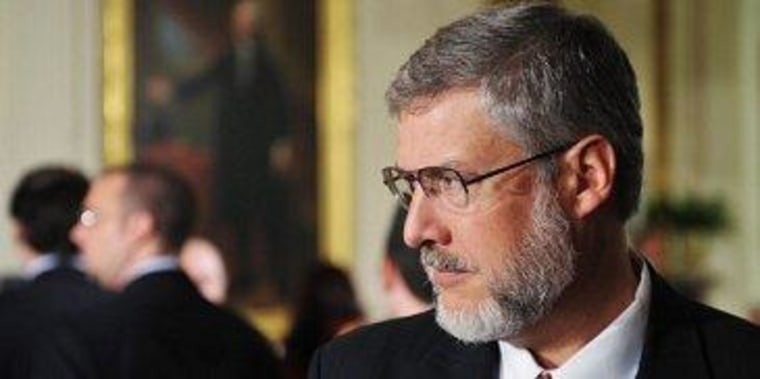Several years ago, Paul Krugman came up with a label to describe the phenomenon of far-right loyalists who are "assured of decent employment, no matter how badly they perform." He called it "wingnut welfare."
The system features countless examples of conservative lawmakers or Bush administration officials who, after embarrassing themselves through the course of public service, land in a cushy and well-paid job, usually at a far-right think tank. Here's a classic of the genre.
David Addington, whose name became synonymous with an expansive view of executive power during President George W. Bush's administration, is taking over the legal division of the conservative Heritage Foundation.The foundation announced Thursday that Addington, 55, a former counsel and chief of staff to Vice President Dick Cheney, will head up Heritage's Center for Legal and Judicial Studies starting Feb. 1.
And what will Addington do, exactly, at Heritage? That's the funny part -- Orin Kerr noted that Addington "will focus on combating excessive claims of federal government power and overreaching claims of the executive branch."
No, seriously. The Wall Street Journal reported that Addington is concerned about President Obama taking "some 'questionable' steps" when it comes to expanding the powers of the White House.
It's reassuring, I suppose, to know the right has not lost its dry sense of humor.
For those who may have forgotten about his antics as one of Dick Cheney's chief lieutenants, Addington was an enthusiastic proponent of "Unitary Theory of the Executive" (or "Unitary Executive Theory") which is a philosophy that grants a president extraordinary -- an extra-legal -- powers, especially in matters related to national security. It's one of the main rationales that led the Bush/Cheney team to use torture -- because "criminal statutes are not read as infringing on the president's ultimate authority" in overseeing a war, as one of the torture memos argued.
Addington also participated in discussions of destroying CIA video footage of detainee torture, and was comfortable arguing the vice president's office is not part of the executive branch.
Let's also not forget that Jack Goldsmith, an Assistant Attorney General in the Bush/Cheney administration, considered Addington a bit of a nut.
[Goldsmith] shared the White House's concern that the Foreign Intelligence Surveillance Act might prevent wiretaps on international calls involving terrorists. But Goldsmith deplored the way the White House tried to fix the problem, which was highly contemptuous of Congress and the courts. "We're one bomb away from getting rid of that obnoxious [FISA] court," Goldsmith recalls Addington telling him in February 2004.
Their debate over the Geneva Conventions was even more striking.
When Goldsmith presented his analysis of the Geneva Conventions at the White House, Addington, according to Goldsmith, became livid. "The president has already decided that terrorists do not receive Geneva Convention protections," Addington replied angrily, according to Goldsmith. "You cannot question his decision." (Addington declined to comment on this and other details concerning him in this article.)Goldsmith then explained that he agreed with the president's determination that detainees from Al Qaeda and the Taliban weren't protected under the Third Geneva Convention, which concerns the treatment of prisoners of war, but that different protections were at issue with the Fourth Geneva Convention, which concerns civilians. Addington, Goldsmith says, was not persuaded.Months later, when Goldsmith tried to question another presidential decision, Addington expressed his views even more pointedly. "If you rule that way," Addington exclaimed in disgust, Goldsmith recalls, "the blood of the hundred thousand people who die in the next attack will be on your hands."
The deterioration of conservative scholarship in the 21st century is an important development, and the Heritage Foundation's decline as a place for credible, substantive work is a symptom of a larger issue. This was evident when the group tapped former Sen. Jim DeMint (R-S.C.) to serve as Heritage's new president, and the addition of Addington only adds weight to the institutional concerns.
